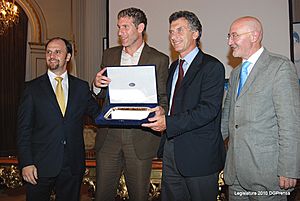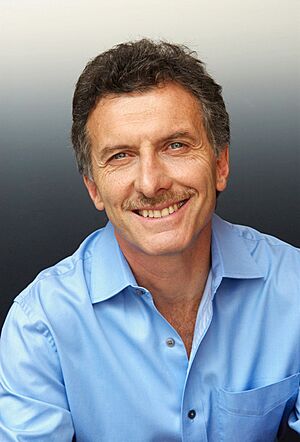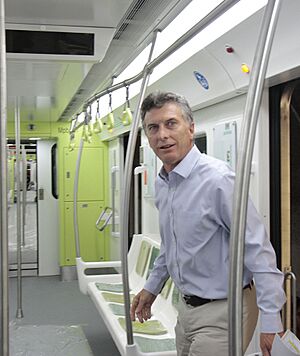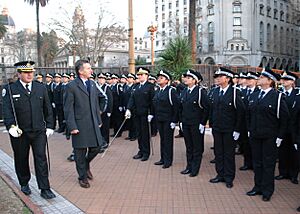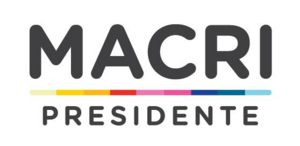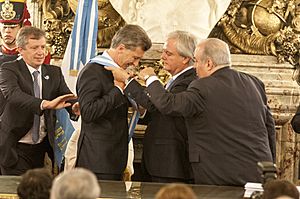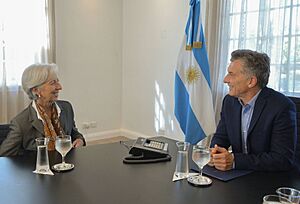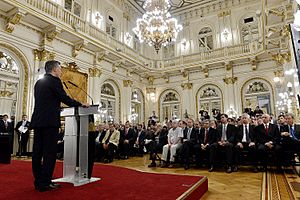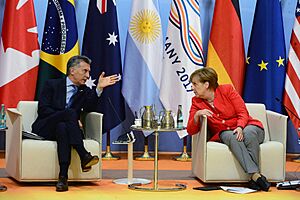Mauricio Macri facts for kids
Quick facts for kids
Mauricio Macri
|
|
|---|---|
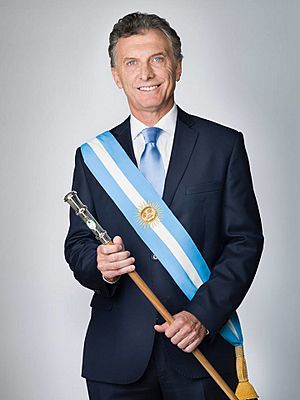
Official portrait, 2015
|
|
| 57th President of Argentina | |
| In office 10 December 2015 – 10 December 2019 |
|
| Vice President | Gabriela Michetti |
| Preceded by | Cristina Fernández de Kirchner |
| Succeeded by | Alberto Fernández |
| President pro tempore of the Union of South American Nations | |
| In office 17 April 2017 – 17 April 2018 |
|
| Preceded by | Nicolás Maduro |
| Succeeded by | Evo Morales |
| 5th Chief of Government of Buenos Aires | |
| In office 10 December 2007 – 10 December 2015 |
|
| Deputy | Gabriela Michetti María Eugenia Vidal |
| Preceded by | Jorge Telerman |
| Succeeded by | Horacio Rodríguez Larreta |
| National Deputy | |
| In office 10 December 2005 – 18 July 2007 |
|
| Succeeded by | Julián Obiglio |
| Constituency | City of Buenos Aires |
| Personal details | |
| Born | 8 February 1959 Tandil, Buenos Aires, Argentina |
| Political party | Republican Proposal (PRO) (since 2008) |
| Other political affiliations |
Commitment to Change (2003–2008) Juntos por el Cambio (2015–2023) |
| Spouses |
Ivonne Bordeu
(m. 1981; div. 1991)Isabel Menditeguy
(m. 1994; div. 2005) |
| Children | 4 |
| Parent |
|
| Relatives | Alejandro Awada (brother-in-law) |
| Alma mater | Pontifical Catholic University of Argentina Columbia University |
| Profession | Civil engineer |
| Signature |  |
Mauricio Macri (born 8 February 1959) is an Argentine businessman and politician. He served as the President of Argentina from 2015 to 2019. He has been the leader of the Republican Proposal (PRO) party since it started in 2005.
Before becoming president, Macri was the Chief of Government of Buenos Aires (like a mayor) from 2007 to 2015. He was also a member of the Chamber of Deputies (part of the national parliament) from 2005 to 2007. He is known for his conservative political ideas.
Macri was born in Tandil, Argentina. He studied to become a civil engineer at the Pontifical Catholic University of Argentina. He also attended Columbia University for business studies. After working in business, he became the president of the famous football club Boca Juniors from 1994 to 2007. This role helped him become well-known to the public.
In 2003, he started his political party, which later became PRO. After trying to become Chief of Government of Buenos Aires in 2003, he was elected in 2007 and again in 2011. Four years later, in 2015, he was elected president of Argentina. This was a historic election because it was the first time Argentina had a second round of voting (called a runoff) for president.
During his time as president, Macri focused on changing Argentina's economy and improving its relationships with other countries. He tried to make the economy more open to international markets. He also worked to reduce government spending and taxes on exports.
Contents
Early Life and Career
Mauricio Macri was born in Tandil, a city in the province of Buenos Aires. His father, Franco Macri, was a successful businessman from Italy. His family moved to Buenos Aires shortly after he was born.
Macri went to Colegio Cardenal Newman for school. He then earned a degree in civil engineering from the Pontifical Catholic University of Argentina. He also studied at Columbia Business School for a short time.
His first jobs were in his father's business group, Socma Group. He worked in construction and later became the general manager of the group. In 1992, he became vice president of Sevel Argentina, a company that made Fiat and Peugeot cars. He became president of Sevel two years later.
Leading Boca Juniors
Mauricio Macri became the chairman of the popular football club Boca Juniors in 1995. He won the election with many votes from the club's members.
His first few years were a bit tough, and the team didn't do very well. He changed coaches several times to try and improve things. The stadium also got some upgrades during this time.
Things changed when Carlos Bianchi became coach. With star players like Juan Román Riquelme, Martín Palermo, and Guillermo Barros Schelotto, Boca Juniors started winning a lot. They even had a record of 40 matches without losing!
During Macri's time as president, Boca Juniors won 16 major titles. This made him the most successful president in the club's history, winning more football titles than anyone before him.
Starting in Politics
In 1991, Macri was kidnapped for 12 days. He was held in a small room and was released after his family reportedly paid a large amount of money. Macri has said that this difficult experience made him want to get involved in politics.
He officially entered politics in 2003. He started a new political party called Commitment to Change. This party aimed to bring new faces into politics because many people had lost trust in the older parties after some big protests in 2001.
Later in 2003, Macri ran to become the mayor of Buenos Aires. He won the first round of voting but lost in the second round to the current mayor, Aníbal Ibarra.
In 2005, Macri joined forces with another party to create the Republican Proposal (PRO) party. He was then elected to the Argentine Chamber of Deputies, which is part of the national parliament.
In 2007, Macri ran for mayor of Buenos Aires again, and this time he won! He was re-elected in 2011, serving two terms as the city's leader.
Leading Buenos Aires
As Chief of Government of Buenos Aires, Macri worked on several important projects for the city.
Improving Public Transport
One big project was the Metrobus system. This is a special bus system with dedicated lanes on main streets, which helps buses move faster and reduces traffic. By the end of his time as mayor, the city had five Metrobus lines.
The city also added many bike lanes to encourage people to cycle. A bike-sharing program called EcoBici was also started, allowing people to rent bicycles easily.
To make traffic flow better, several railway crossings were replaced with tunnels. This helped both cars and trains move more smoothly. Macri's team also planned big projects to raise parts of the train lines on viaducts, removing more street-level crossings.
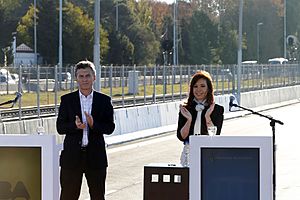
The Buenos Aires Underground (subway system) was also a focus. Older subway cars were replaced with modern ones, making rides more comfortable for passengers.
Creating the Metropolitan Police
When Macri became mayor, the city of Buenos Aires did not have its own police force. The national police handled security. In 2008, Macri proposed creating the Buenos Aires Metropolitan Police to work alongside the federal police.
This new police force started with about 1,000 officers. Over time, the responsibility for police protection was fully transferred to the city.
Views on Same-Sex Marriage
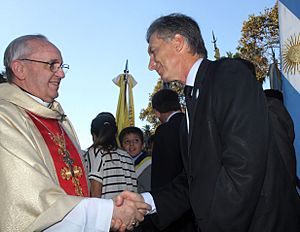
During Macri's time as mayor, a court case allowed a gay couple to get married in Buenos Aires. This was the first same-sex marriage in Argentina. Macri decided not to challenge this court decision. He believed that same-sex marriage was becoming more accepted around the world and that people had a right to happiness.
He compared it to when divorce became legal in Argentina, which was also controversial at first but later accepted. A national law allowing same-sex marriage was passed the following year.
Presidential Elections
2015 Election Campaign
Mauricio Macri ran for president of Argentina in 2015. The current president, Cristina Kirchner, could not run again. Early polls showed a close race between Macri, Daniel Scioli, and Sergio Massa.
Macri's party, PRO, joined with other parties like the Radical Civic Union (UCR) and the Civic Coalition (CC) to form a group called Cambiemos (which means "Let's Change"). Macri chose Gabriela Michetti as his running mate for vice president.
In the first round of the election, Daniel Scioli came in first, but Macri was a close second. This meant they had to go to a second round of voting, called a ballotage.
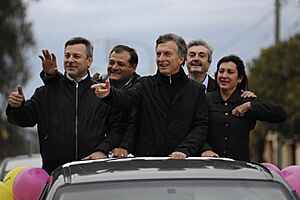
Before the second round, Macri and Scioli had a debate. Macri criticized Scioli's campaign for trying to scare people about what might happen if Macri became president.
The second round of voting was held on 22 November 2015. Macri won the election, ending 12 years of the Kirchner family's political influence in Argentina. His victory was seen by some as a big change for the country and the region.
2019 Election
In 2019, Mauricio Macri ran for re-election as president. He won his party's primary election, but he faced a strong challenge from Alberto Fernández and his running mate, former president Cristina Kirchner.
In the general election on 27 October 2019, Alberto Fernández won the presidency. He received enough votes to win without needing a second round. Macri became the first sitting president in Argentina to lose re-election for a second term.
Presidency of Mauricio Macri
| Presidential styles of Mauricio Macri |
|
|---|---|
 |
|
| Reference style | Excelentísimo Señor Presidente de la Nación (Most Excellent President of the Nation) |
| Spoken style | Presidente de la Nación (President of the Nation) |
| Alternative style | Señor Presidente (Mister President) |
Taking Office
Macri announced his team of ministers (cabinet) about two weeks before he became president. The changeover from the previous government was a bit tricky.
Macri officially took office on 10 December 2015. He took his oath at the National Congress of Argentina. After that, he gave a speech where he promised to support an independent justice system, fight corruption, and work for the unity of Argentina. He also promised to improve education and ensure everyone had a home and basic services.
Later, at the Casa Rosada (the presidential palace), he received the presidential sash. He then went to the balcony and spoke to the crowd in the Plaza de Mayo, telling them that Argentines deserved to live better and that a wonderful period was beginning for the country.
Economic Changes
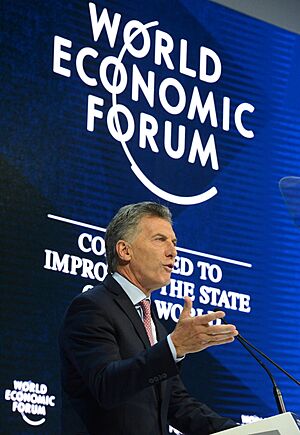
Macri's presidency started with some economic challenges. The country's money reserves were low, and prices were rising quickly (inflation was high). There were also high taxes and a large government debt.
One of Macri's first economic decisions was to remove controls on foreign money. This allowed people in Argentina to buy and sell foreign currencies more freely. The Argentine peso (the local currency) then became less valuable compared to other currencies. He also removed taxes on exports like corn and wheat.
Macri wanted to fix Argentina's financial problems with international lenders. This would allow Argentina to borrow money again from other countries and strengthen its economy. In 2016, Argentina reached an agreement to pay back its old debts, which had been a problem since 2001.
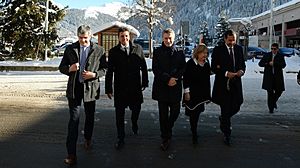
In January 2016, Macri attended the World Economic Forum in Davos, Switzerland. This was a big meeting where world leaders and business people discuss global issues. It was the first time Argentina had been there in many years, showing Macri's goal to reconnect Argentina with the world economy.
During his first year, the economy improved slowly. The government started public works projects to create jobs and help the construction industry. The official statistics office (INDEC) also started providing more accurate economic numbers.
However, rising prices (inflation) continued to be a problem throughout his term. In 2018, the economy faced more difficulties, partly due to a drought that affected farming and a rise in the value of the US dollar. Argentina sought a loan from the International Monetary Fund (IMF) to help with the economic situation.
The government also worked to reduce import taxes on certain goods and removed taxes on technology products to encourage investment. They also allowed more low cost airlines to operate in Argentina, like JetSmart and Flybondi.
Energy Policy
For many years, the prices for public services like electricity, gas, and water were kept very low by the government. The government paid a lot of money to keep these prices down, but this also meant less investment in these services. As a result, Argentina started to have power outages and had to import energy.
In 2016, Macri's government began to remove these government payments (subsidies) for electricity, gas, and water. This caused prices for these services to go up a lot, which led to some protests.
To increase energy production, Macri signed a deal for the Vaca Muerta shale deposit in Patagonia. This area has one of the largest reserves of shale gas in the world. The goal was to attract investments and produce more energy for Argentina.
Foreign Relations
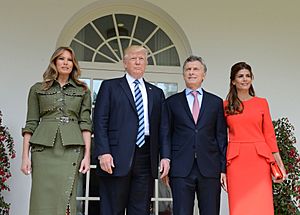
Under Macri, Argentina's relationships with other countries changed a lot. He pushed for action against the government of Nicolás Maduro in Venezuela because of human rights concerns. Argentina also worked with other countries in the Mercosur trade bloc to prevent Venezuela from taking a leadership role.
Mercosur also worked towards a trade agreement with the European Union and closer ties with the Pacific Alliance. Macri also improved relations with the United States. In 2016, President Barack Obama visited Argentina and praised Macri's efforts to reconnect Argentina with the global economy.
Macri continued Argentina's claim over the Falkland Islands. However, he took a less aggressive approach towards the United Kingdom and allowed more flights between Argentina and the islands.
Macri also changed Argentina's stance on conflicts in the Middle East. He canceled a previous agreement with Iran regarding a 1994 terrorist attack in Buenos Aires. He encouraged continued investigations into this attack and improved relations with Israel. In 2017, Israeli Prime Minister Benjamin Netanyahu made a historic visit to Argentina. In 2019, Macri's government officially called Hezbollah a terrorist organization.
Personal Life
Mauricio Macri has been married three times. His first wife was Ivonne Bordeu, and they had three children: Agustina, Jimena, and Francisco. After they divorced, he married Isabel Menditeguy in 1994, but they divorced in 2005.
In 2010, Macri married businesswoman Juliana Awada. At their wedding party, he famously wore a fake mustache as part of a Freddie Mercury impersonation. He accidentally swallowed the mustache, and a minister had to help him! Macri is also a very good bridge player and has even represented Argentina in international competitions.
Electoral History
Executive Roles
| Election | Office | List | Votes | Result | Ref. | |||
|---|---|---|---|---|---|---|---|---|
| Total | % | P. | ||||||
| 2003 1-R | Chief of Government of Buenos Aires | Commitment to Change | 660,748 | 37.55% | 2nd | → Round 2 | ||
| 2003 2-R | Commitment to Change | 807,385 | 46.52% | 2nd | Not elected | |||
| 2007 1-R | Republican Proposal | 798,292 | 45.76% | 1st | → Round 2 | |||
| 2007 2-R | Republican Proposal | 1,007,729 | 60.94% | 1st | Elected | |||
| 2011 1-R | Republican Proposal | 836,608 | 47.07% | 1st | → Round 2 | |||
| 2011 2-R | Republican Proposal | 1,090,389 | 64.27% | 1st | Elected | |||
| 2015 1-R | President of Argentina | Cambiemos | 8,601,131 | 34.15% | 2nd | → Round 2 | ||
| 2015 2-R | Cambiemos | 12,988,349 | 51.34% | 1st | Elected | |||
| 2019 | Juntos por el Cambio | 10,811,586 | 40.28% | 2nd | Not elected | |||
Legislative Roles
| Election | Office | List | # | District | Votes | Result | Ref. | |||
|---|---|---|---|---|---|---|---|---|---|---|
| Total | % | P. | ||||||||
| 2005 | National Deputy | Republican Proposal | 1 | City of Buenos Aires | 611,178 | 34.09% | 1st | Elected | ||
Honours and Awards
National Awards
 Argentina : Grand Master of the Order of the Liberator General San Martín
Argentina : Grand Master of the Order of the Liberator General San Martín Argentina : Grand Master of the Order of May
Argentina : Grand Master of the Order of May
International Awards
 Brazil: Grand Collar of the Order of the Southern Cross, awarded by Michel Temer
Brazil: Grand Collar of the Order of the Southern Cross, awarded by Michel Temer France: Grand Cross of the Legion of Honour, awarded by François Hollande
France: Grand Cross of the Legion of Honour, awarded by François Hollande Italy: Knight Grand Cross with Collar of the Order of Merit of the Italian Republic, awarded by Sergio Mattarella
Italy: Knight Grand Cross with Collar of the Order of Merit of the Italian Republic, awarded by Sergio Mattarella Japan Grand Cordon of the Order of the Chrysanthemum
Japan Grand Cordon of the Order of the Chrysanthemum Mexico: Grand Cross of the Order of the Aztec Eagle, awarded by Enrique Peña Nieto
Mexico: Grand Cross of the Order of the Aztec Eagle, awarded by Enrique Peña Nieto Netherlands: Knight Grand Cross of the Order of the Netherlands Lion, awarded by Willem-Alexander of the Netherlands
Netherlands: Knight Grand Cross of the Order of the Netherlands Lion, awarded by Willem-Alexander of the Netherlands Norway: Grand Cross of the Order of St. Olav, awarded by King Harald V
Norway: Grand Cross of the Order of St. Olav, awarded by King Harald V Spain: Knight of the Collar of the Order of Isabella the Catholic, awarded by Felipe VI of Spain
Spain: Knight of the Collar of the Order of Isabella the Catholic, awarded by Felipe VI of Spain
See also
 In Spanish: Mauricio Macri para niños
In Spanish: Mauricio Macri para niños


